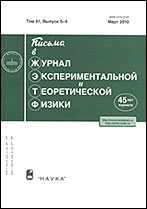|
|
Письма в Журнал экспериментальной и теоретической физики, 2002, том 76, выпуск 11, страницы 799–804
(Mi jetpl2996)
|
 |
|
 |
Эта публикация цитируется в 1 научной статье (всего в 1 статье)
РАЗНОЕ
How behavior of systems with sparse spectrum can be predicted on a quantum computer
Yu. I. Ozhigov
Insitute of Physics and Technology, Russian Academy of Sciences, Moscow
Аннотация:
Call a spectrum of Hamiltonian $H$ sparse if each eigenvalue can be quickly restored within $\varepsilon$ from its rough approximation within $\varepsilon_1$ by means of some classical algorithm. It is shown how a behavior of system with sparse spectrum up to time $T={(1-\rho)}/{14\varepsilon}$ can be predicted on a quantum computer with the time complexity $t={4}/{(1-\rho)\varepsilon_1}$ plus the time of classical algorithm, where $\rho$ is the fidelity. The quantum knowledge of Hamiltonian eigenvalues is considered as the new Hamiltonian $W_H$ whose action on each eigenvector of $H$ gives the corresponding eigenvalue. Speedup of an evolution for systems with the sparse spectrum is possible because for such systems the Hamiltonian $W_H$ can be quickly simulated on the quantum computer. For an arbitrary system (even in the classical case) its behavior cannot be predicted on a quantum computer even for one step ahead. By this method we can also restore the history with the same efficiency.
Поступила в редакцию: 01.04.2002
Исправленный вариант: 30.10.2002
Образец цитирования:
Yu. I. Ozhigov, “How behavior of systems with sparse spectrum can be predicted on a quantum computer”, Письма в ЖЭТФ, 76:11 (2002), 799–804; JETP Letters, 76:11 (2002), 675–680
Образцы ссылок на эту страницу:
https://www.mathnet.ru/rus/jetpl2996 https://www.mathnet.ru/rus/jetpl/v76/i11/p799
|


|





 Обратная связь:
Обратная связь: Пользовательское соглашение
Пользовательское соглашение
 Регистрация посетителей портала
Регистрация посетителей портала Логотипы
Логотипы








 Цитирование в формате
Цитирование в формате 
